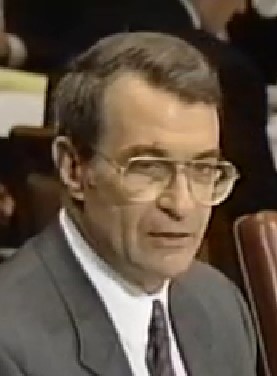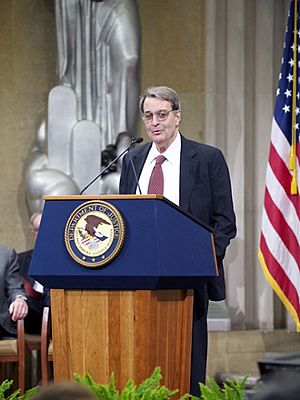Philip Heymann facts for kids
Quick facts for kids
Philip B. Heymann
|
|
|---|---|
 |
|
| 27th United States Deputy Attorney General | |
| In office May 28, 1993 – March 17, 1994 |
|
| President | Bill Clinton |
| Preceded by | George J. Terwilliger III |
| Succeeded by | Jamie Gorelick |
| United States Assistant Attorney General for the Criminal Division | |
| In office 1978–1981 |
|
| President | Jimmy Carter |
| Preceded by | Benjamin R. Civiletti |
| Succeeded by | D. Lowell Jensen |
| Personal details | |
| Born |
Philip Benjamin Heymann
October 30, 1932 Pittsburgh, Pennsylvania, U.S. |
| Died | November 30, 2021 (aged 89) Los Angeles, California, U.S. |
| Political party | Democratic |
| Spouse |
Ann Ross
(m. 1954) |
| Children | Stephen, Jody |
| Education | Yale University (BA) Harvard University (JD) |
| Occupation |
|
Philip Benjamin Heymann (October 30, 1932 – November 30, 2021) was an American lawyer and professor. He worked for the United States government in important roles. He was the Assistant Attorney General for the Criminal Division during President Jimmy Carter's time. Later, he was briefly the Deputy Attorney General for President Bill Clinton.
Heymann was known for supporting people's rights and freedoms. He also studied how to fight terrorism while still respecting the law. He taught law at Harvard Law School for many years.
Contents
Early Life and Education
Philip Heymann was born in Pittsburgh, Pennsylvania, on October 30, 1932. His father owned an insurance business. He graduated from Shady Side Academy in 1950.
In 1954, he earned his bachelor's degree from Yale University. He then received a Fulbright grant to study in Paris, France. After that, he served two years in the Air Force. He reviewed security clearances, which means he checked if people were safe to work in sensitive jobs.
Later, he got his law degree from Harvard Law School. He was one of the top students in his class. After law school, he worked for Justice John M. Harlan at the Supreme Court. This job is called a "clerkship."
Government Career
Working for the Solicitor General
From 1961 to 1965, Heymann worked for the Solicitor General of the United States. The Solicitor General represents the U.S. government in cases before the Supreme Court. Heymann argued six cases in front of the Supreme Court.
At the State Department
In 1965, Heymann joined the State Department. He worked in the Bureau of Security and Consular Affairs. This office handles things like passports and visas.
He once stopped the Passport Office from watching a professor who was an anti-nuclear activist. Heymann believed Americans should have freedom to travel. He helped make sure that government surveillance requests were known and approved.
In 1967, he became an assistant to Nicholas Katzenbach, a high-ranking official. Heymann helped review a case where a diplomat's security clearance was taken away years earlier. The review showed the diplomat was innocent, and his clearance was given back.
Harvard and Watergate
In 1969, Heymann began teaching at Harvard Law School. He was one of the few professors hired who had a lot of real-world experience. He also taught at the Harvard Kennedy School.
When the Watergate scandal investigation began in 1973, Heymann's former boss, Archibald Cox, was chosen to lead it. Cox asked Heymann to help him set up the investigation office.
When President Richard Nixon fired Cox, Heymann supported Cox. He later returned to work for Cox's successor, Leon Jaworksi, during the summers of 1974 and 1975.
Later Career and Public Service
Heymann served as the Assistant Attorney General for the Criminal Division from 1978 to 1981. This role involves overseeing federal criminal investigations and prosecutions.
From 1993 to 1994, he was the Deputy Attorney General. This is the second-highest position in the Justice Department. He later left this role due to disagreements about how the department was managed.
He was also involved in groups that worked on legal and government issues. He was a co-chairman of the Constitution Project's Sentencing Committee. He was also elected to the Common Cause National Governing Board, which is a group that works for good government.
Family Life
In 1954, Philip Heymann married Ann Ross. They had two children, Stephen and Jody. His son, Stephen Heymann, also became a lawyer for the government. His daughter, Jody, became a professor and later a dean at the University of California, Los Angeles.
Philip Heymann passed away on November 30, 2021, at the age of 89. He died from problems related to a stroke.
 | Bayard Rustin |
 | Jeannette Carter |
 | Jeremiah A. Brown |


